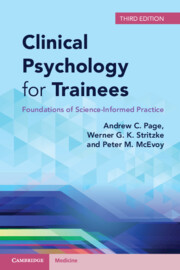Book contents
- Clinical Psychology for Trainees
- Clinical Psychology for Trainees
- Copyright page
- Contents
- Chapter 1 A Science-Informed Model of Clinical Psychology Practice
- Chapter 2 Relating with Clients
- Chapter 3 Assessing Clients
- Chapter 4 Matching Treatments and Monitoring Client Progress
- Chapter 5 Linking Assessment to Treatment: Case Formulation
- Chapter 6 Treating Clients
- Chapter 7 Brief Interventions
- Chapter 8 Low-Intensity Psychological Interventions
- Chapter 9 Group Treatment
- Chapter 10 Programme Evaluation
- Chapter 11 Case Management
- Chapter 12 Supervision
- Chapter 13 Managing Ruptures in Therapeutic Alliance
- Chapter 14 Respecting the Humanity of Clients: Cross-Cultural and Ethical Aspects of Practice
- Chapter 15 Providing Therapy at a Distance and Working in Rural and Remote Settings
- Chapter 16 Psychologists as Health Care Providers
- Chapter 17 Working in Private Practice – Dr Clair Lawson; Clinical Psychologist and Director; Lawson Clinical Psychology
- References
- Index
Chapter 4 - Matching Treatments and Monitoring Client Progress
Published online by Cambridge University Press: 14 April 2022
- Clinical Psychology for Trainees
- Clinical Psychology for Trainees
- Copyright page
- Contents
- Chapter 1 A Science-Informed Model of Clinical Psychology Practice
- Chapter 2 Relating with Clients
- Chapter 3 Assessing Clients
- Chapter 4 Matching Treatments and Monitoring Client Progress
- Chapter 5 Linking Assessment to Treatment: Case Formulation
- Chapter 6 Treating Clients
- Chapter 7 Brief Interventions
- Chapter 8 Low-Intensity Psychological Interventions
- Chapter 9 Group Treatment
- Chapter 10 Programme Evaluation
- Chapter 11 Case Management
- Chapter 12 Supervision
- Chapter 13 Managing Ruptures in Therapeutic Alliance
- Chapter 14 Respecting the Humanity of Clients: Cross-Cultural and Ethical Aspects of Practice
- Chapter 15 Providing Therapy at a Distance and Working in Rural and Remote Settings
- Chapter 16 Psychologists as Health Care Providers
- Chapter 17 Working in Private Practice – Dr Clair Lawson; Clinical Psychologist and Director; Lawson Clinical Psychology
- References
- Index
Summary
The evidence-based practice of clinical psychology may begin with a review of efficacy studies, but it cannot end there. It needs to translate these data to the patient who presents for treatment. The chapter begins with a discussion of the principles whereby a clinical psychologist can seek to match evidence-based treatments to a client’s clinical presentation.The chapter additionally reviews future developments in personalized medicine and methods that have the potential to improve the matching of treatments to presenting problems. The chapter also considers how session-to-session progress can be monitored to identify when a patient’s progress deviates (either positively or negatively) from an expected course.The concept of clinical significance is described, and practical illustrations are provided of how this can be used to monitor progress and ways of responding to clients who are on and off track are outlined. The discussion of why Routine Outcomes Monitoring systems work is demonstrated by illustrating implementation in routine clinical conversations.
Keywords
- Type
- Chapter
- Information
- Clinical Psychology for TraineesFoundations of Science-Informed Practice, pp. 49 - 62Publisher: Cambridge University PressPrint publication year: 2022



